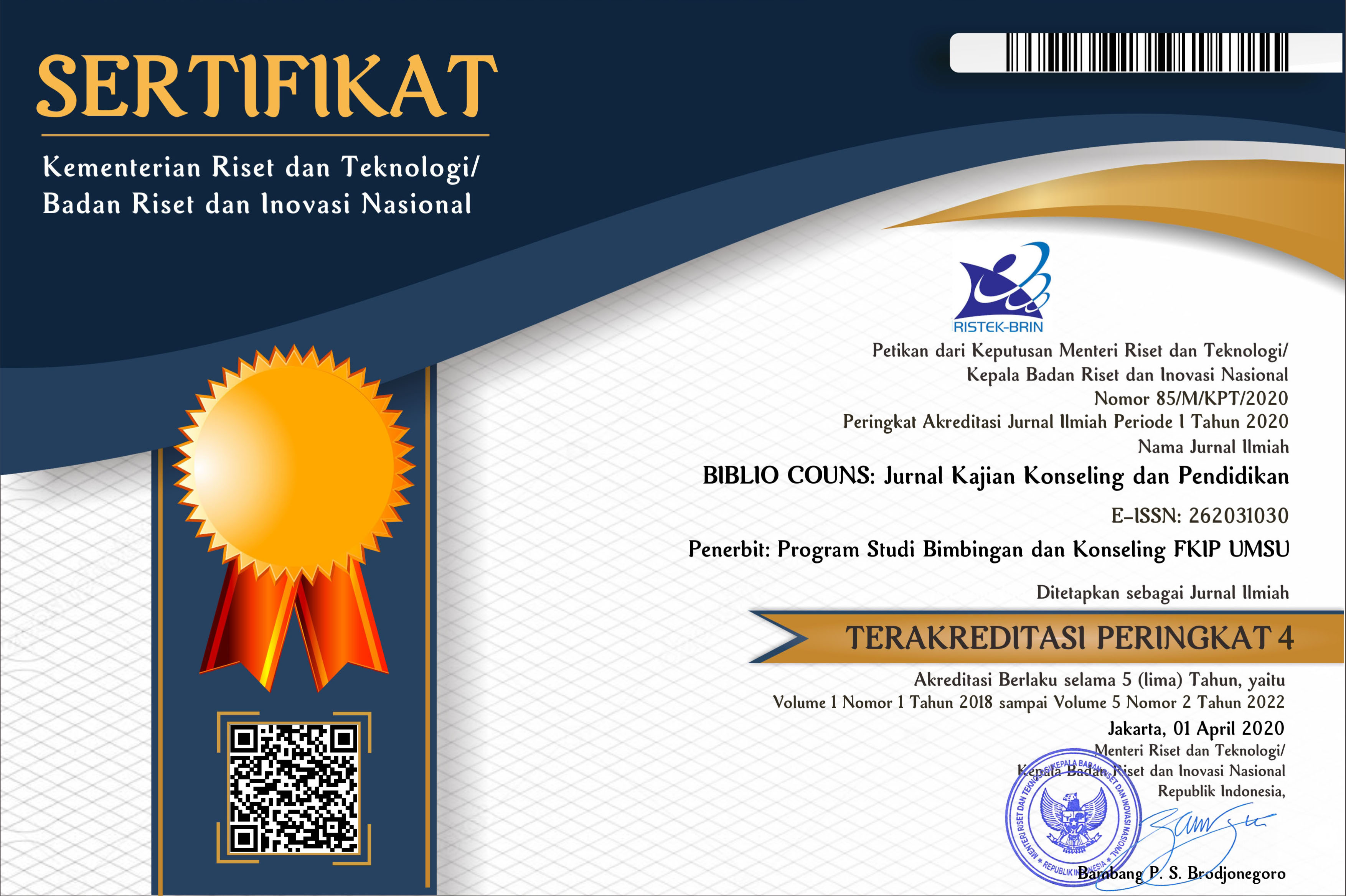Urgensi Self-Efficacy Mahasiswa pada Pembelajaran Jarak Jauh
Abstract
Self-efficacy is an important motivational variable that has been shown to have a considerable influence on a number of academic outcomes, such as an individual's interest, their task performance, and the amount of effort and persistence they are willing to expend when faced with adversity. The development of research related to self-efficacy shows that there is an urgency to continue to improve self-efficacy in the learning process. The purpose of this study was to deepen the understanding of the importance of student self-efficacy in the process or distance learning. This study uses a literature review method with data collection techniques from articles, books, and proceedings. The results of the study indicate that there is urgency in an effort to improve learning outcomes through increasing students' self-confidence that they are able to complete assignments and participate in online learning activities without feeling excessive anxiety, stress, and academic burnout. The urgency of self-efficacy in students is supported by various studies that show a positive relationship between self-efficacy and psychological aspects of students, and a negative relationship between self-efficacy and student psychological disorders.
Keywords
Full Text:
PDFReferences
Afifah, L., & Indriwardhani, S. P. (2021). Students self-efficacy in learning foreign language during the COVID-19 pandemic. KnE Social Sciences, 235241. https://knepublishing.com/index.php/KnE-Social/article/view/8545
Afifah, S. N., & Kusuma, A. B. (2021). Pentingnya kemampuan self-efficacy matematis serta berpikir kritis pada pembelajaran daring matematika. JURNAL MathEdu (Mathematic Education Journal), 4(2), 313320. https://doi.org/10.37081/mathedu.v4i2.2642
Asmuni, A. (2020). Problematika pembelajaran daring di masa pandemi covid-19 dan solusi pemecahannya. Jurnal Paedagogy, 7(4), 281288. https://doi.org/10.33394/jp.v7i4.2941
Azizli, N., Atkinson, B. E., Baughman, H. M., & Giammarco, E. A. (2015). Relationships between general self-efficacy, planning for the future, and life satisfaction. Personality and Individual Differences, 82, 58-60. https://doi.org/10.1016/j.paid.2015.03.006
Bandura, A. (1995). Self-efficacy in Changing. Cambridge University Press.
Bandura, A. (1997). Self-Efficacy in Changing Societies. Cambridge University Press.
Berk, L. E. (2017). Development through the lifespan. Amerika Serikat: Pearson.
Bouih, A., Nadif, B., & Benattabou, D. (2021). Assessing the effect of general self-efficacy on academic achievement using path analysis: a preliminary study. Journal of English Language Teaching and Applied Linguistics, 3(4), 18-24. https://doi.org/10.32996/jeltal.2021.3.4.3
Capri, B., Ozkendir, O. M., Ozkurt, B., & Karakus, F. (2012). General self-efficacy beliefs, life satisfaction and burnout of university students. Procedia-Social and Behavioral Sciences, 47, 968-973. https://doi.org/10.1016/j.sbspro.2012.06.765
Chen, Y., & Starobin, S. S. (2017). Measuring and examining general self-efficacy among community college students: a structural equation modeling approach. Community College Journal of Research and Practice, 42(3), 171189. https://doi.org/10.1080/10668926.2017.1281178
Faisaludin, F., & Itsna, I. T. A. N. U. R. (2016). Hubungan self efficacy dengan perilaku menyontek mahasiswa. Jurnal Ilmu Dan Teknologi Kesehatan, 7(2). http://ojs.stikesbhamadaslawi.ac.id/index.php/jik/article/view/9
Fatima, Y. M., Nafisah, A., Lusiana, T. V., Dewi, S. S., & Marmoah, S. (2021). Efikasi diri mahasiswa peserta kegiatan pertukaran pelajar melalui perkuliahan jarak jauh. Perspektif Ilmu Pendidikan, 35(1), 2536. https://doi.org/10.21009/PIP.351.3
Hadiprasetyo, K., Exacta, A. P., & Maharani, A. (2020). Matematika dengan pembelajaran dalam jaringan (daring) selama masa darurat covid-19 pada siswa kelas VIII SMP negeri 2 Ngadirojo tahun ajaran 2019/2020. Jurnal Pendidikan, Sains Sosial Dan Agama, VI (2), 612.
Huang, X., & Mayer, R. E. (2019). Adding self-efficacy features to an online statistics lesson. Journal of Educational Computing Research, 57(4), 10031037. https://doi.org/10.1177/0735633118771085
Husetiya, Y. (2010). Hubungan asertivitas dengan prokrastinasi akademik pada mahasiswa Fakultas Psikologi Universitas Diponegoro Semarang [Disertiasi, Universitas Diponegoro]. Semarang.
Ifdil, I., Apriani, R., Yendi, F. M., & Rangka, I. B. (2016). Level of studentsself-efficacy based on gender. COUNS-EDU: The International Journal of Counseling and Education, 1(1), 2933. https://doi.org/10.23916/29-33.0016.11-i41b
Indirwan, I., Suarni, W., & Priyatmo, D. (2021). Pentingnya self-efficacy terhadap prestasi belajar matematika. Jurnal Sublimapsi, 2(1), 6170. http://dx.doi.org/10.36709/sublimapsi.v2i1.13055
Jatisunda, M. G. (2017). Hubungan self-efficacy siswa SMP dengan kemampuan pemecahan masalah matematis. Jurnal Theorems, 1(2), 24-30. DOI: 10.31949/th.v1i2.375
Karaman, M.A., Kumaran, A.C., Haktanir, A. & Lenz, S. (2018). Predictors of Counselor-in-Training Students' General Self-Efficacy. Akdeniz Egitim Arastirmalari Dergisi, 12(25), 136-149. https://doi.org/10.29329/mjer.2018.153.8
Kumar, V., Talwar, R., & Raut, D. K. (2013). Psychological distress, general self-efficacy and psychosocial adjustments among first year medical college students in New Delhi, India. South East Asia Journal of Public Health, 3(2), 35-40. https://doi.org/10.3329/seajph.v3i2.20038
Lee, J.-W., & Mendlinger, S. (2011). Perceived self-efficacy and its effect on online learning acceptance and student satisfaction. Journal of Service Science and Management, 4(03), 243-252. DOI: 10.4236/jssm.2011.43029
Manzano-Sanchez, H., Outley, C., Gonzalez, J. E., & Matarrita-Cascante, D. (2018). The influence of self-efficacy beliefs in the academic performance of Latina/o students in the United States: A systematic literature review. Hispanic Journal of Behavioral Sciences, 40(2), 176209. https://doi.org/10.1177/0739986318761323
Morales-Rodrguez, F. M., & Prez-Mrmol, J. M. (2019). The role of anxiety, coping strategies, and emotional intelligence on general perceived self-efficacy in university students. Frontiers in psychology, 10, 1-9. https://doi.org/10.3389/fpsyg.2019.01689
Oktariani, O. (2018). Peranan self efficacy dalam meningkatkan prestasi belajar siswa. Jurnal Psikologi Kognisi, 3(1), 4554. http://dx.doi.org/10.22303/kognisi.3.1.2018.41-50
Pamungkas, H. P. (2020). Self-regulated learning bagi mahasiswa: pentingkah? Jurnal Pendidikan Ekonomi, 13(1), 6975. https://dx.doi.org/10.17977/um014v13i12020p069
Permatasari, N., Sutanto, L., & Ismail, N. S. (2021). Hubungan efikasi diri terhadap tingkat kejenuhan akademik: studi empiris pembelajaran daring semasa COVID-19. Jurnal Sosio Sains, 7(1), 3650. http://journal.lldikti9.id/sosiosains
Pudjiastuti, E. (2012). Hubungan self efficacy dengan perilaku mencontek mahasiswa psikologi. MIMBAR: Jurnal Sosial Dan Pembangunan, 28(1), 103111.
Ramdhani, A., Ramdhani, M. A., & Amin, A. S. (2014). Writing a Literature Review Research Paper: A step-by-step approach. International Journal of Basic and Applied Science, 3(1), 4756. http://insikapub.com/Vol-03/No-01/08IJBAS(3)(1).pd.
Rizkiana, A. (2017). Pengaruh self efficacy terhadap hasil belajar mahasiswa berprestasi (mawapres) STKIP PGRI Bangkalan. EQUILIBRIUM: Jurnal Ilmiah Ekonomi Dan Pembelajarannya, 5(2), 117122. http://doi.org/10.25273/equilibrium.v5i2.1538
Rustika, I. M. (2016). Efikasi Diri: Tinjauan Teori Albert Bandura. Buletin Psikologi, 20(12). https://doi.org/10.22146/bpsi.11945
Seto, S. B., Suryani, L., & Bantas, M. G. D. (2020). Analisis Efikasi Diri Dan Hasil Belajar Berbasis E-Learning Pada Mahasiswa Program Studi Pendidikan Matematika. Prima Magistra: Jurnal Ilmiah Kependidikan, 1(2), 147152. https://doi.org/10.37478/jpm.v1i2.472
Severino, S., Aiello, F., Cascio, M., Ficarra, L., & Messina, R. (2011). Distance education: The role of self-efficacy and locus of control in lifelong learning. Procedia-Social and Behavioral Sciences, 28, 705717. https://doi.org/10.1016/j.sbspro.2011.11.132
Sevindi, T. (2013). The relationship between general self-efficacy belief and burnout level among Turkish academicians. Educational Research and Reviews, 8(24), 2255-2259. https://doi.org/10.5897/ERR2013.1649
Shen, D., Cho, M.-H., Tsai, C.-L., & Marra, R. (2013). Unpacking online learning experiences: Online learning self-efficacy and learning satisfaction. The Internet and Higher Education, 19, 1017. https://doi.org/10.1016/j.iheduc.2013.04.001
Shin, H., Lee, J., Kim, B., & Lee, S. M. (2012). Students perceptions of parental bonding styles and their academic burnout. Asia Pacific Education Review, 13(3), 509517. https://doi.org/10.1007/s12564-012-9218-9
Tan, J. F., Ma, Z. W., & Li, X. T. (2015). Global self-esteem mediates the effect of general self-efficacy on Chinese undergraduates' general procrastination. Social Behavior and Personality: an international journal, 43(8), 1265-1271. https://doi.org/10.2224/sbp.2015.43.8.1265
Tannert, S., & Grschner, A. (2021). Joy of distance learning? How student self-efficacy and emotions relate to social support and school environment. European Educational Research Journal, 20(4), 498519. https://doi.org/10.1177/14749041211024784
mmet, D. (2017). Structural relationships among counselling self-efficacy, general self-efficacy and positive-negative affect in psychological counsellor candidates. Educational Sciences: Theory & Practice, 17(6), 1875-1892. https://doi.org/10.12738/estp.2017.6.0180
Vayre, E., & Vonthron, A.-M. (2017). Psychological engagement of students in distance and online learning: Effects of self-efficacy and psychosocial processes. Journal of Educational Computing Research, 55(2), 197218. https://doi.org/10.1177/0735633116656849
Wibasuri, A., & Lilyana, B. (2014). Determinan self efficacy dalam kemandirian belajar mahasiswa pada perguruan tinggi swasta di Bandar Lampung. L4PM IBI Darmajaya.
Wibowo, R. F. (2014). Self efficacy dan prokrastinasi pada mahasiswa fakultas psikologi universitas surabaya. CALYPTRA, 3(1), 111. https://journal.ubaya.ac.id/index.php/jimus/article/view/1894
Yusuf, S. (2017). Bimbingan dan konseling perkembangan suatu pendekatan komprehensif. PT Refika Aditama.
Zimmerman, W. A., & Kulikowich, J. M. (2016). Online learning self-efficacy in students with and without online learning experience. American Journal of Distance Education, 30(3), 180191. https://doi.org/10.1080/08923647.2016.1193801
DOI: https://doi.org/10.30596/bibliocouns.v5i1.8866
Refbacks
- There are currently no refbacks.
Biblio Couns: Jurnal Kajian Konseling dan Pendidikan
Universitas Muhammadiyah Sumatera Utara
Kampus Utama
Jl. Kapten Muchtar Basri No.3, Glugur Darat II,Medan
Sumatera Utara-20238
E-mail: jbcons@umsu.ac.id



